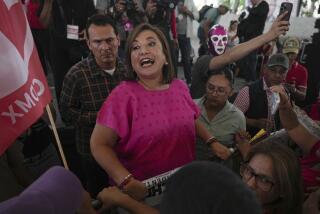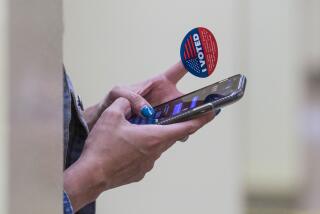Concerning Serb Elections, Let’s Look the Other Way
- Share via
Next Sunday, presidential, parliamentary and local elections will be held in Yugoslavia--or more precisely in Serbia, since Montenegro, its smaller partner republic, declared its nonparticipation.
The Serbian opposition is, alas, internally divided, rather nationalist and not very popular outside the urban centers. Apparently the opposition, in choosing to go ahead with the game called by the Yugoslav President Slobodan Milosevic, calculated that being a part of a farce is better than being an outsider to a farce.
But nobody should be fooled: The conditions are not there for these elections to be free and fair. Past experience shows that Milosevic cheats; nothing will stop him from cheating this time. It is therefore more than likely that a few days after the Sept. 24 elections, people in Serbia and outside will declare the elections stolen. Therefore, would it not seem judicious to observe the whole electoral process?
No. Given that it is unlikely that the international community could muster enough qualified people who would be allowed in to observe, it is strongly advisable for foreign institutions, organizations and groups not to observe, at least not officially or even overtly, lest it gives the elections an air of a bona fide democracy.
The regional elections observer, the Organization for Security and Cooperation in Europe, has canceled its exploratory mission because it did not obtain the required visas. And Milosevic has said that monitors from NATO countries will not be admitted. Of course, Serbia is not entirely without friends; one can picture a motley multi-continental group of rubber-stampers as observers from Belarus, China, Libya, Iraq, Myanmar and Venezuela.
But even if some legitimate international organization were to be admitted, it should not accept the role of fig leaf. Here is why:
* No government, and especially not one with such an appalling electoral cheating record as Yugoslavia, should be allowed to pick and choose who can monitor its elections.
* It is late in the game; the OSCE usually sends a long-term observation mission to the country six to eight weeks before an election.
* Given the centralized power in Serbia--Milosevic and his wife, Mirjana Markovic, constitute a one-bedroom dictatorship--there is little chance that irregularities of tabulation, most of them probably happening at the high level, would be caught by outsiders.
* Spot observation by diplomats would be unlikely to observe anything else than the Potemkin-village appearance of voting stations--if indeed the diplomats were even allowed into the stations.
* Covert monitoring from bona fide organizations would lack credibility and could be risky: The recent arrests by the Yugoslav army of British, Canadian and Dutch nationals in Montenegro shows that Milosevic does not shy away from detaining foreigners.
So would the elections be better left unmonitored? Not necessarily. The Serb opposition and their Montenegrin friends can and will come up with monitoring teams. They live with the system, they speak the language, they have monitored before. They have seen cheating before and so they are better qualified to see it when it happens again.
There is another argument for letting Serbs--at least officially--observe their own elections: Not only the ruling clique but also much of the political opposition has been hostile to foreigners, suspicious of international involvement and rather openly anti-American. Any Western involvement, especially by the U.S., would be denounced by Milosevic as meddling.
So it is safer and more productive to discreetly channel aid to Serbia through the independent media, democratic-minded mayors and nongovernmental organizations and wait for them to report not if but how Milosevic stole the elections. After all, the point of participating in such a sham is to energize the opposition, and this only the Serbs themselves can do.
More to Read
Sign up for Essential California
The most important California stories and recommendations in your inbox every morning.
You may occasionally receive promotional content from the Los Angeles Times.










